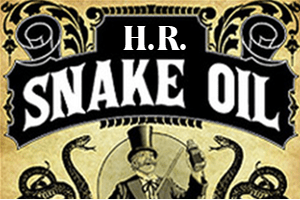In the December 17, 2019 Ask The Headhunter Newsletter, The Headhunter calls a year-end time-out and recaps the fundamental rules of job hunting that will help you outsmart America’s broken Employment System.
 Special Edition!
Special Edition!
Judging from the many questions I receive each week from subscribers, I worry that job seekers are falling into the most obvious traps while trying to navigate America’s antiquated Employment System. Let me show you how to go around!
In place of the normal weekly Q&A, at the end of each year I publish a summary of Ask The Headhunter methods to help you land the job you want. Last year’s Ask The Headhunter Secrets in A Nutshell were based on key concepts in my PDF books.
This year, I’d like to review seven Ask The Headhunter rules that address some of the most fundamental misconceptions that lead job seekers astray. Relying on job postings, resumes, cover letters and traditional interviews is the worst way to approach your job search!
Job hunting with The Headhunter
The best way to win the right job is to use the approach we discuss here every week. Let’s step back to rediscover the basics about how to handle your job-hunting challenges. These tips should help you overcome the many obstacles the Employment System throws at you.
1. Avoid traditional, unproductive methods of job hunting.
Don’t leave control of your job search to external forces like job postings, personnel jockeys, employment agencies, resume screeners and software algorithms. Don’t rely on the passive approach of chasing jobs that come along, then filling out impersonal online job applications. Don’t rely on sending resumes (or your LinkedIn profile) to people who don’t know you. Don’t wait for boiler-plate rejections or silly instructions from inept recruiters who ask you for your information all over again.
Take control of your job search.
2. Select 4-5 companies you really want to work for.
You cannot reasonably and ably chase 50 jobs or companies, no matter what Indeed and ZipRecruiter tell you. Carefully select three, four or five companies — not because they’ve posted jobs, but because they’re the shining-light organizations you really want to work for! Research these carefully selected companies online using relevant news outlets, business journals and industry-specific publications.
Better yet, identify and contact your target company’s employees, customers and vendors. Go hang out where they hang out — get insight and advice from insiders!
The goal is to learn what specific problems and challenges an employer faces. These will reveal a company’s motivation to hire you. Understand these problems and challenges before approaching any company.
3. Define what you have to offer that’s relevant.
Be able to describe your specific skills and abilities but only as they relate to a company’s specific problems and challenges. A hiring manager doesn’t need to know everything about you. In fact, sharing too much makes evaluating you more confusing, and it makes the manager’s job harder. The goal is to make the manager’s job of assessing your value easier — by communicating exactly how you will be a truly useful hire.
If you don’t understand an employer’s exact needs, your presentation will not be relevant or useful to the manager and you will not be hired.
4. Prove your value.
Managers are terrible at figuring out what to do with a job applicant. It’s up to you to help a manager focus on the objective of a job interview: How will your abilities profit the manager and the company? This is perhaps the easiest idea for job seekers to grasp, but the most difficult to apply.
You should be ready to frame your candidacy like this: “If you hire me, I will do A, B and C, which should add $X to your bottom line.” Sound daunting? The best job candidates can do it, and you must learn how. Be ready to explain and defend your proposal and your rough calculations.
5. Identify the specific manager who will benefit from hiring you.
Get an introduction to the hiring manager through a mutual contact that you developed through your research. Those people you spoke with about the company’s problems and challenges? Some of them will be your perfect introduction to the right manager! Don’t waste your time with personnel jockeys in the HR department. That’s what your competition is doing.
The goal is to “tell it” directly to the manager who will hire you — not anyone else.
6. Go to the interview ready to do the job.
Be ready to clearly and convincingly show the manager how you will help solve his or her specific problems. Make your interview a hands-on, working meeting with the hiring manager.
7. Control your interview and win an offer.
If the manager interviewing you seems to be asking canned questions, bring the discussion around to how you would do the actual work. Ask what the specific job tasks and objectives are. Then take control of the interview by offering to demonstrate to the manager that you:
- Understand the work that needs to be done
- Can do the work
- Can do the work the way the employer wants it done, and
- Can do it profitably.
In other words, show up with a mini business plan about how you will do the job — to win the job!
That’s how to be the job candidate who stands out and gets hired. Avoid the silly conventions of the Employment System that daily conspires to keep apart managers and the people they need to hire. The links above will help you on your way around the system. As you develop questions, ask them here — I’ll offer my advice and so will the rest of our community!
Okay, I listed seven rules for job hunting. What did I miss? What smart rules do you recommend that you follow on your job search? How do we beat the broken Employment System?
: :
For additional help, don’t miss this limited-time offer on the Ask The Headhunter PDF books!
HOLIDAY SPECIAL: SORRY! THIS OFFER HAS EXPIRED!
Every Ask The Headhunter PDF Book
EXPIRED
(What books are we talking about? Click here to see all Nick’s PDF books!)
TAKE [EXPIRED]% OFF any book or bundle! ORDER NOW!
Use DISCOUNT CODE=MERRY40
This is a limited-time offer! [EXPIRED] Order now!
 This is the last Ask The Headhunter column for 2019. I’m taking a couple of weeks off for the holidays! See you next on January 7, 2020! Here’s wishing you a Merry Christmas and a Happy, Healthy and Prosperous New Year — and all my best wishes for whatever holidays you observe this time of year!
This is the last Ask The Headhunter column for 2019. I’m taking a couple of weeks off for the holidays! See you next on January 7, 2020! Here’s wishing you a Merry Christmas and a Happy, Healthy and Prosperous New Year — and all my best wishes for whatever holidays you observe this time of year!
If you’re new to Ask The Headhunter, or just want a refresher on the main ideas we discuss here every week, please check The Basics — and take advantage of the search box at top right, as well as the Q&A Archive under Sections in the menu bar!









 After months of looking for a job, I finally got an offer using your methods. (Thanks! The interviewer said I was the best candidate she’s talked to in a long time.) But there’s a small matter that concerns me, and it’s not the money. The salary is good. But neither the interviewer nor the HR person would tell me who my boss will be. HR just said I’d be assigned to the manager who needed my skills the most. Then she said they need my answer by end of day tomorrow. Is this a trap? Should I take the job?
After months of looking for a job, I finally got an offer using your methods. (Thanks! The interviewer said I was the best candidate she’s talked to in a long time.) But there’s a small matter that concerns me, and it’s not the money. The salary is good. But neither the interviewer nor the HR person would tell me who my boss will be. HR just said I’d be assigned to the manager who needed my skills the most. Then she said they need my answer by end of day tomorrow. Is this a trap? Should I take the job?
 Is a credit report from the big three credit reporting agencies (e.g.,
Is a credit report from the big three credit reporting agencies (e.g., 
 I am writing a letter of recommendation for a co-worker who is interviewing for a new job. It’s sort of a quid pro quo situation. Both he and I are somewhat unsure of how to write one, especially when doing it for a co-worker.
I am writing a letter of recommendation for a co-worker who is interviewing for a new job. It’s sort of a quid pro quo situation. Both he and I are somewhat unsure of how to write one, especially when doing it for a co-worker.







